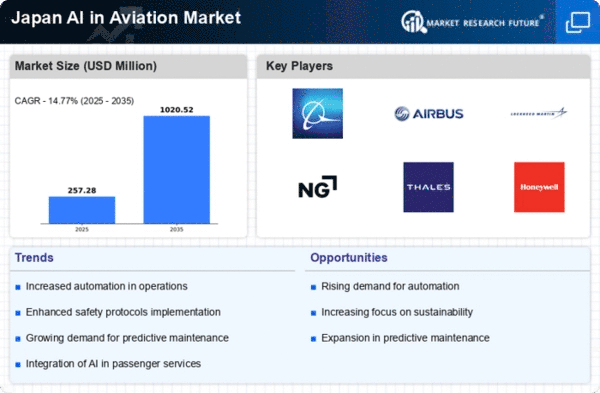Technological Advancements in AI
The rapid evolution of artificial intelligence technologies is a primary driver for the AI in Aviation Market. In Japan, advancements in machine learning and data analytics are enabling airlines to optimize operations and enhance safety protocols. For instance, AI algorithms can analyze vast amounts of flight data to predict potential mechanical failures, thereby reducing downtime and maintenance costs. The Japanese government has been investing heavily in AI research, with funding exceeding ¥100 billion in recent years, which is likely to further accelerate the adoption of AI solutions in aviation. This technological momentum appears to be fostering a competitive landscape where airlines are increasingly integrating AI into their operational frameworks, thus driving growth in the ai in-aviation market.
Regulatory Support and Frameworks
The regulatory environment in Japan is evolving to support the integration of AI technologies in aviation. The Ministry of Land, Infrastructure, Transport and Tourism has been actively developing guidelines that facilitate the safe implementation of AI systems in air traffic management and safety protocols. This regulatory backing is crucial as it provides a structured approach for airlines to adopt AI solutions without compromising safety. Furthermore, the establishment of a national AI strategy aims to position Japan as a leader in AI innovation, which could potentially increase investments in the ai in-aviation market. As regulations become more favorable, airlines are likely to invest more in AI technologies, thereby enhancing operational efficiency and passenger safety.
Rising Competition Among Airlines
The competitive landscape among airlines in Japan is intensifying, prompting carriers to seek innovative solutions to differentiate themselves. The ai in-aviation market is benefiting from this competitive pressure, as airlines increasingly adopt AI technologies to enhance operational efficiency and customer service. For instance, airlines are utilizing AI for dynamic pricing strategies, optimizing flight schedules, and personalizing customer interactions. This competitive drive is reflected in the projected growth of the aviation sector, with revenues expected to reach ¥5 trillion by 2027. As airlines strive to maintain a competitive edge, the integration of AI solutions is likely to become a key strategy, thereby propelling the growth of the ai in-aviation market.
Increased Investment in Smart Airports
The concept of smart airports is gaining traction in Japan, driven by the need for improved operational efficiency and passenger experience. Investments in AI technologies are central to the development of smart airports, which utilize AI for various functions, including baggage handling, security checks, and passenger flow management. The Japanese government has allocated approximately ¥200 billion for the modernization of airport infrastructure, which includes the integration of AI systems. This investment is expected to enhance the overall efficiency of airport operations and improve the passenger experience. As airports evolve into smart hubs, the ai in-aviation market is likely to experience substantial growth, driven by the demand for innovative solutions.
Growing Demand for Enhanced Safety Measures
Safety remains a paramount concern in the aviation sector, and the increasing demand for enhanced safety measures is driving the ai in-aviation market. In Japan, the aviation industry is witnessing a surge in passenger traffic, which necessitates the implementation of advanced safety protocols. AI technologies can analyze real-time data to identify potential hazards and improve decision-making processes. According to recent statistics, the number of air passengers in Japan is projected to reach 150 million by 2026, indicating a pressing need for innovative safety solutions. This growing demand for safety enhancements is likely to propel investments in AI-driven technologies, thereby fostering growth in the ai in-aviation market.
















